How and where should I live? This is probably one of the most important questions future students ask themselves before they start their studies. The following chapters will give you an overview of the student housing situation in Linz:
- Student housing in Linz
- Apartment
- Shared flats
- Housing law consultation of the Bundes-ÖH
- Housing subsidy
- Heating cost subsidy
There are a number of student dormitories in Linz, which are particularly suitable for first-year students due to their proximity to the university. In order to get one of the coveted places in a dormitory, it is important to apply to the dormitory of your choice in good time. The application process varies from dormitory to dormitory. We therefore recommend that you check with your preferred dormitory in advance regarding the application process. The assignment or rejection of your place in the dormitory will always be made in writing by the dormitory operator.
If the rental contract is then concluded, it is important to note that it contains information about the home place, the contract period, notice periods, amount of the fee, deposit and the arbitration clause. The contract is concluded for one year at a time. First-year students are an exception. They are granted a two-year contract at the beginning of their studies. Please note: As a dormitory resident, you are subject to the Student Dormitory Act.
Unfortunately, the experience of the last few years has shown us that it makes sense to document the condition of your room when you move into a dormitory. We advise you to take pictures of existing damages and to report them to the dormitory management. If these damages are not repaired by the dormitory, the photos are especially helpful when moving out.
Here is an overview of the most important student dormitories in Linz:
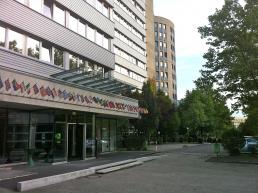 Raab-Heim
Raab-Heim
Location: Julius-Raab-Straße 10, 4040 Linz
Phone: +43 (0) 732/ 2457 – 378
E-mail: office.linz@studentenwerk.at
Website: http://www.studentenwerk.at/studenten/raab
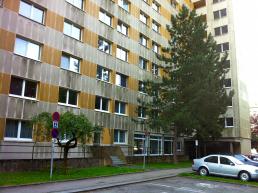 WIST homes
WIST homes
Location: Johann-Wilhelm-Klein-Strasse 70, 4040 Linz
Phone: +43 (0) 732/ 25 15 33
E-mail: office@wistooe.at
Website: http://www.wist.uni-linz.ac.at
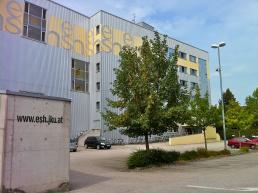
ESH home
Location: Julius-Raab-Straße 1-3, 4040 Linz
Phone: +43 (0) 732/ 2551 – 600
E-mail: glettner@esh.jku.at
Website: http://www.esh.jku.at/
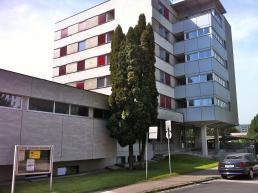
KHG Home
Location: Mengerstraße 23, 4040 Linz
Phone: +43 (0) 732/ 244 011 – 71
E-mail: betrieb@m2.khg.jku.at
Website: http://www.khg-linz.at/

Kepler Home
Location: Altenberger Straße 74, 4040 Linz
Phone: +43 (0) 732/ 244 031 201
E-mail: office@jk-heim.at
Website: https://jk-heim.at/
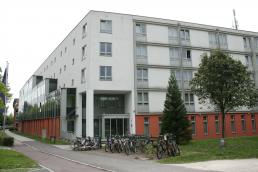 Dormitory Akademikerhilfe
Dormitory Akademikerhilfe
Location: Pulvermühlstraße 41, 4040 Linz
Phone: +43 (0) 732/ 750 747 – 54
E-mail: studentservice@akademikerhilfe.at
Website: http://www.akademikerhilfe.at/heime/linz/pulvermuehlstrasse-41/
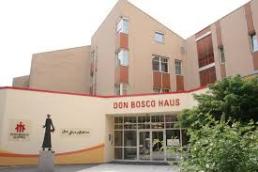 House Don Bosco
House Don Bosco
Location: Beethovenstrasse 13, 4020 Linz
Phone: +43 (0) 732/ 65 16 94 – 0
E-mail: office@don-bosco.at
Website: http://www.don-bosco.at/
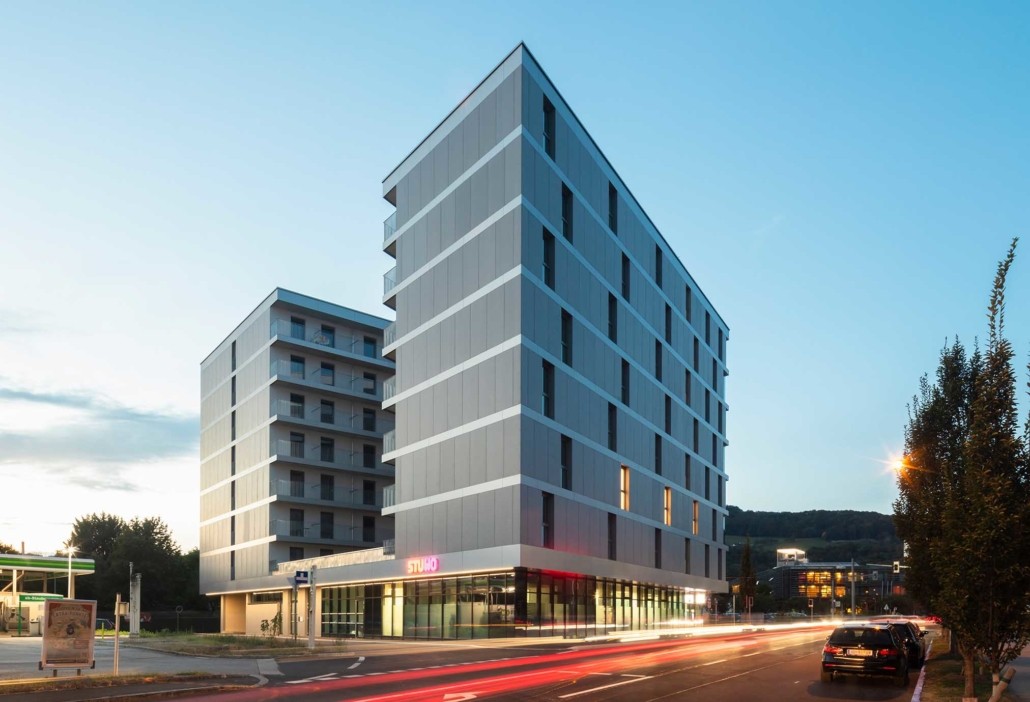 STUWO Linz
STUWO Linz
Location: Altenbergerstraße 9, 4040 Linz
Phone: +43 732 89 09 80
E-mail: linz@stuwo.at
Website: https://www.stuwo.at/studentenheime/linz/
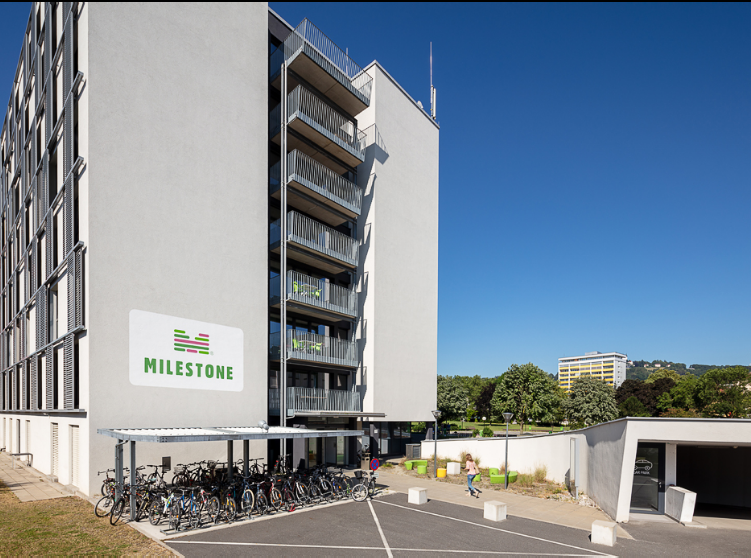 Milestone Linz
Milestone Linz
Bruckner Studios
Location: Peuerbachstraße 28, 4040 Linz
Phone: +43 1 90 614
E-Mail: connect@milestone.net
Website: www.milestone.net
The Chamber of Labor also constantly updates its home database, which can be helpful for you in choosing the right home: http://www.heimdatenbank.at/.
Your own apartment is certainly the most comfortable way to live during your studies. However, it is usually also the most expensive. So before you start looking for an apartment, you should think about your financial situation. Do you have enough savings on the side to cover possible acquisition costs? You should also always keep an eye on your ongoing fixed costs.
When looking for an apartment, it is advisable to "search" through newspaper advertisements and apartment exchanges on the Internet - you can also find out about available apartments here on our homepage.
Here is the link to our housing exchange: http://oeh.jku.at/boerse/wohnangebote
Tip: The most important thing when looking for an apartment is to call as soon as possible!
Housing cooperatives also offer themselves in the search for affordable housing. However, there may be longer waiting times for an apartment here. Furthermore, there are different membership conditions that you should consider before enrolling. You can find detailed information on the websites of the different cooperatives. Here is a list of the most important non-profit housing companies:
- HEIMSTÄTTE Company Ltd.
http://www.egw-linz.at/ - WOHNUNGSFREUNDE non-profit building and settlement society GmbH
http://www.wohnungsfreunde.at - Non-profit industrial housing corporation (GIWOG)
http://www.giwog.at - Non-profit regional housing cooperative for Upper Austria (LAWOG)
http://www.lawog.at - Non-profit Upper Austrian Housing and Settlers' Association (WSG)
http://www.wsg.at - Non-profit housing cooperative EIGENHEIM
http://www.eigenheim-linz.at - Non-profit housing and settlement cooperative BAUREFORM-WOHNSTÄTTE
http://www.brw.at - Non-profit housing cooperative FAMILY
http://www.familie-linz.at - Non-profit housing and settlement cooperative NEUE HEIMAT
http://www.neue-heimat-ooe.at - GWG - Non-profit housing association of the city of Linz
http://www.gwg-linz.at - WAG - Non-profit housing association of Linz
http://www.wag.at - UPPER AUSTRIA. Housing
http://www.ooewohnbau.at - United Linz Housing Cooperatives (VLW)
http://www.vlw.at - Housing cooperative LEBENSRÄUME
http://www.lebensraeume.at
Once you have found a suitable apartment, a rental agreement is signed. The lease is a verbal or written agreement between a landlord and a person looking for an apartment.
Important: Rental agreements are usually formal contracts. However, you should read the contract carefully before you sign it. If there is any ambiguity, be sure to ask and, if necessary, have it checked again before signing.
Written rental agreements are subject to fees. Actually, both landlord and tenant would have to pay this fee to the tax office, but in practice, the fee is passed on to the tenant. It amounts to 1 percent of the sum of three times the annual gross rent in the case of unlimited contracts.
The shared apartment is probably the most typical form of housing in college. Renting a large apartment together saves a lot of money. Starting with the rent and including the costs for electricity, water, internet and telephone connection - many expenses can be shared in a WG and this is easy on the wallet.
However, it should be noted that there are no special legal regulations for shared apartments. That is why it is important to make clear rental agreements when drawing up the rental contract. A lease agreement for a shared apartment can be a sublease or a master lease. The following contractual options exist:
All roommates enter into a joint master lease. This is the variant that is usually desired by the landlords. In this case, all roommates must pull together and are also jointly liable. This is a difficult construction if conflicts arise within the flat-sharing community. Especially if one person wants to leave the flat-sharing community prematurely. Therefore, it should be legally agreed in this case that the rights and obligations of the leaving tenant can be transferred to the remaining tenants.
It is better if the resident with the most stable living conditions takes over the main rent and concludes sublease agreements with the other flatmates. A change of subtenants is then possible without the landlord's consent. However, if the main tenant leaves the apartment, the subtenancy also ends.
Attention: In some leases, there is a clause that either prohibits the total or partial subletting or makes it dependent on the landlord's consent. It is therefore essential to discuss this issue with the landlord in advance.
Housing law advice from the Federal Austrian Landlord and Tenant Association (Bundes-ÖH)
Since Austrian tenancy law is an extremely complex matter, the Austrian National Union of Students offers special housing law advice. The ÖH housing law experts Josef Iraschko and Bernhard Wernitznig are available to answer all your questions regarding housing law.
Contact:
Housing Law Counseling of the Federal ÖH
Contact persons: Josef Iraschko; Bernhard Wernitznig
Address: Taubstummengasse 7-9/4, 1040 Vienna
Telephone: + 43 (0) 1/ 310 88 80 – 41
E-mail: wohnrecht@oeh.ac.at
Housing Subsidy Regulation Upper Austria
In Austria, housing assistance is regulated by the individual state governments and thus varies from state to state. In Upper Austria, housing assistance is paid out in the form of monthly grants. For this purpose, an application must be submitted annually to the Office of the Upper Austrian Provincial Government.
The amount of the housing allowance is determined by the difference between the allowable and reasonable housing expenses:
Household income (annual twelfths)
minus weighted household income (sum of weighting factors * 580 EUR)
= reasonable housing expense
Allowable housing expense (reasonable usable floor space * maximum 3.7 EUR)
minus reasonable housing expense
= housing allowance per month
The upper limit of the housing allowance is 300 EUR for subsidized apartments. A housing allowance is only paid if the amount is at least 7 EUR per month.
Furthermore, the housing allowance depends on the following criteria:
-
- Number of persons living in the shared apartment
- Income of all persons living in the apartment
- Appropriate usable living space (max. 45 m² for the first person; max. 15 m² for each additional person)
- Allowable housing expenses (maximum limit is 3.7 EUR per m² of usable floor space)
In addition, students must also meet the following requirements in order to be entitled to the full calculated housing allowance:
Minimum income above the marginal earnings limit
and/or student grants
Students who do not receive a study allowance and cannot prove a minimum income can be granted a housing allowance reduced by 50 percent.
For more information on housing assistance and the application form, please visit:
https://www.land-oberoesterreich.gv.at/wohnbeihilfe.htm
Contact:
Office of the Upper Austrian Provincial Government
Department of Housing Subsidies
Address: Bahnhofplatz 1, 4021 Linz
Phone: +43 (0) 732/ 77 20 - 141 40
Website: https://www.land-oberoesterreich.gv.at/wohnbeihilfe.htm
Heating cost subsidy from the state of Upper Austria
Here are the requirements and information on the heating cost subsidy for the year 2020/21:
The province of Upper Austria grants socially needy persons with main residence in Upper Austria for the heating period 2020/21 a one-time heating cost subsidy
-
- in the amount of EUR 152 per household, if the household income is below the established income limits for social needs;
These income limits (as of 2021) are as follows for
-
- Single persons: 950 EUR per month
- married couples/cohabiting couples: EUR 1,500 per month
- each minor child with family allowance: 240 EUR
- the first additional adult person in the household: EUR 520
- each additional adult person in the household: 350 EUR
- allowance for apprentice compensation: 232,49 Euro
Heating cost subsidies paid out by individual municipalities are taken into account in the heating cost subsidy of the state of Upper Austria.
Further information at:
https://www.land-oberoesterreich.gv.at/52800.htm
Contact and application:
At the relevant municipal office of residence or magistrate.
Status: October 2021



